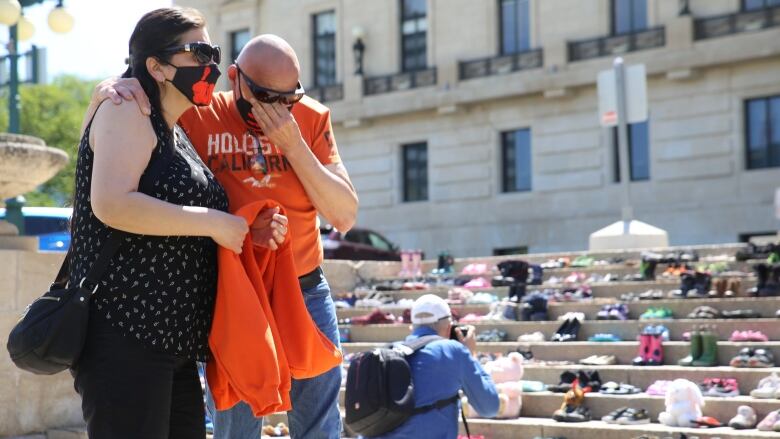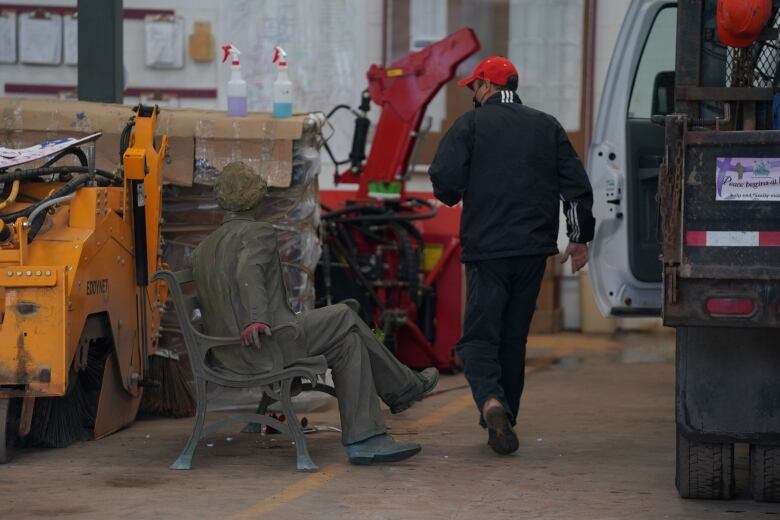After Kamloops, the politics of Indigenous reconciliation will never be the same
Overnight, the question at the heart of the reconciliation debate shifted from 'how far' to 'how soon'

At the end of his remarks during Tuesday night's "take note" debate on the possiblediscovery of the remains of up to 215 children on the grounds of a former residential school in British Columbia, Justin Trudeau acknowledged the limited utility of words.
"Saying sorry for the tragedies of the past is not enough," the prime minister said. "Only with our actions can we choose a better path, and that is what our government will always try to do."
On the need for action, at least, there is broadagreement.
"We all mourn the loss of those children, but to honour their lives, we need to move beyond words to action," NDP leader Jagmeet Singh told the House of Commons on Monday.
"I want action," Conservative Leader Erin O'Toole said at his own news conference.
WATCH: Conservative Leader Erin O'Toole reacts to report out of Kamloops
There are still disagreements onhow to move forward. Naturally, the federal parties have differing views on whether the actions of the last six years have pushed Canadians and Indigenous Peoples towardtrue reconciliation.
But the news out of Kamloops,and the political response to it,have confirmed that there'sno turning back. Morally and politically, the weight of responsibility is undeniable.
Media and political attention will move on, eventually, but it's harder than ever nowto imagine that any government could easily get away withshirking that responsibility.
Six months ago, the Conservative leader was caught on camera defending the original stated purpose of residential schools. On Monday, he again renounced those comments but he also scrambled away from his previous support for statues commemorating John A. Macdonald when he was informed by a reporter that the city council in Charlottetown had just voted to remove the first prime minister's likeness from a public square.

Like Singh, O'Toole called on Justin Trudeau's government to accelerate efforts to investigate possible burial sites and account for the children who died in residential schools somethingcalled for by the Truth and Reconciliation Commission.
He also accused the prime minister of being more about talk than action. O'Toole said the Liberal government hasn't done enough to bring clean drinking water to Indigenous communities 107 boil-water advisories have been liftedbut 52 remain and accused Trudeau of moving at a "snail's pace" to implement the recommendations of the TRC.
Six years ago, Stephen Harper's government didn't immediately commit to any of the TRC's 94 calls to action when the commission tabled its interim report and recommendations in June 2015. Harper's Conservatives said theywanted to wait to read the final report, which was delivered after that year's election.
Slow progress
Trudeau quickly promised that a Liberal government would implement all 94 recommendations.NDP leader Tom Mulcair said he was not being "realistic" by promising to pursue them all at once.
In fairness, not all of the TRC's recommendations apply tofederal jurisdiction. And Mulcair might have been wise to counsel against over-promising.
But those recommendationsnow feel like table stakes for Canada'spolitical leaders, and for the country itself.
Theyalso offer one way to measure progress even if they demonstrate how difficult it can be to decide how the last six years should be evaluated.
When the Liberals assessed their own record in 2019, they reported that progress had been made on more than 80 per cent of the 76 calls to action that involved the federal government nine were said to be"fully implemented," 54 were described as "well underway" and 13 were in the "early planning stages."
The CBC's ongoing tally of all 94 TRC recommendationsfinds that 10 have been completed, 24 are underway and 38 have proposed solutions while 22 have yet to be addressed at all.
'We have to do better'
But the Yellowhead Institute, a First Nation-led research centre based at Ryerson University, believes progress can only be measured by how many calls to action have been fully implemented. It says that just eight met that standardlast year.
"I think our government has done a lot, but we have to do better," Nathaniel Erskine-Smith, the independent-minded Liberal MP, said when it was his turn to speak during Tuesday evening's debate.
Since the reports out ofKamloops last week, MPs have agreed to fast-track two government bills that respond to the TRC: C-8, which changes the citizenship oath to acknowledge treaty rights, and C-5, which establishes a national day for reconciliation.
Another bill currently before the House, C-15, would requirethe government to ensure Canadian laws are consistent with the United Nations Declaration on the Rights of Indigenous Peoples.Conservatives remain opposed to that legislation.
WATCH: Indigenous leaders call on Ottawa to examine residential school sites for graves
"What is there more to do on reconciliation?" Trudeau asked aloudduring a news conference on Monday. "An awful lot."
In the four-minute answer that followed, Trudeau used the phrase "we need to" a dozen times.
While Trudeau reminded reporters this week that action must be taken in partnership with Indigenous peoples, the government is justifiably fieldingquestions all the time now about whether it should be moving faster or further. Impatience is warranted.
The new baseline
But it's veryhard nowto imagine that the next prime minister (whoever that is)will face less pressure to do more. It might be nearly impossible now to go backward. What the Liberals have done overthelast six years might at least be regarded as the new baseline.
After calling on the government to "accelerate" its pursuit of the TRC's calls to action, Singh told the House on Tuesday that only "a lack of political will"standsin the way of implementing them. O'Toole said MPs owed it to the children who died in residential schoolsto "redouble our efforts today toward reconciliation and healing."
But even if those rhetorical markers had not been laid down this week, there would still be those thousands of pairs of children's shoeslaid out at makeshift memorials in cities and towns across the country.
Many Canadians knew very little before this week aboutthe pain and suffering in this nation's past, and how it informs the present. It should be that much harder to ignore now.














_(720p).jpg)


 OFFICIAL HD MUSIC VIDEO.jpg)
.jpg)



























































































